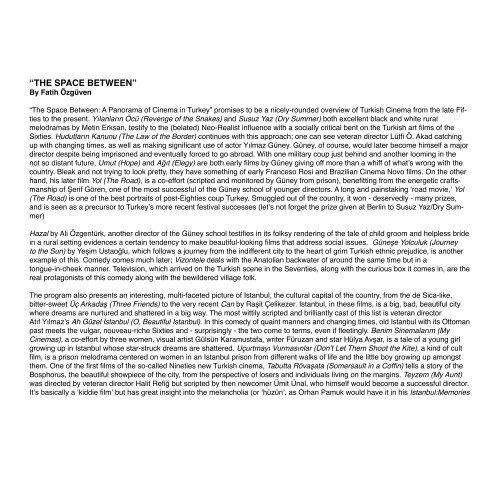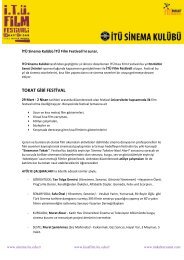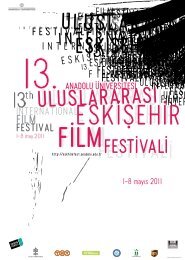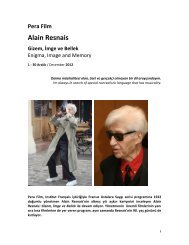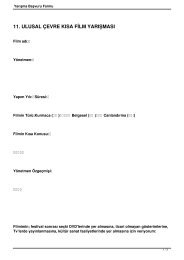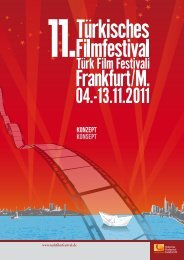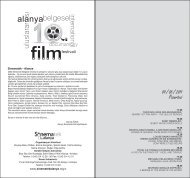You also want an ePaper? Increase the reach of your titles
YUMPU automatically turns print PDFs into web optimized ePapers that Google loves.
“THE SPACE BETWEEN”<br />
By Fatih Özgüven<br />
“The Space Between: A Panorama of Cinema in Turkey” promises to be a nicely-rounded overview of Turkish Cinema from the late Fifties<br />
to the present. Yılanların Öcü (Revenge of the Snakes) <strong>and</strong> Susuz Yaz (Dry Summer) both excellent black <strong>and</strong> white rural<br />
melodramas by Metin Erksan, testify to the (belated) Neo-Realist influence with a socially critical bent on the Turkish art films of the<br />
Sixties. Hudutların Kanunu (The Law of the Border) continues with this approach; one can see veteran director Lütfi Ö. Akad catching<br />
up with changing times, as well as making significant use of actor Yılmaz Güney. Güney, of course, would later become himself a major<br />
director despite being imprisoned <strong>and</strong> eventually forced to go abroad. With one military coup just behind <strong>and</strong> another looming in the<br />
not so distant future, Umut (Hope) <strong>and</strong> Ağıt (Elegy) are both early films by Güney giving off more than a whiff of what’s wrong with the<br />
country. Bleak <strong>and</strong> not trying to look pretty, they have something of early Franceso Rosi <strong>and</strong> Brazilian Cinema Novo films. On the other<br />
h<strong>and</strong>, his later film Yol (The Road), is a co-effort (scripted <strong>and</strong> monitored by Güney from prison), benefitting from the energetic craftsmanship<br />
of Şerif Gören, one of the most successful of the Güney school of younger directors. A long <strong>and</strong> painstaking ‘road movie,’ Yol<br />
(The Road) is one of the best portraits of post-Eighties coup Turkey. Smuggled out of the country, it won - deservedly - many prizes,<br />
<strong>and</strong> is seen as a precursor to Turkey’s more recent festival successes (let’s not forget the prize given at Berlin to Susuz Yaz/Dry Summer)<br />
Hazal by Ali Özgentürk, another director of the Güney school testifies in its folksy rendering of the tale of child groom <strong>and</strong> helpless bride<br />
in a rural setting evidences a certain tendency to make beautiful-looking films that address social issues. Güneşe Yolculuk (Journey<br />
to the Sun) by Yeşim Ustaoğlu, which follows a journey from the indifferent city to the heart of grim Turkish ethnic prejudice, is another<br />
example of this. Comedy comes much later; Vizontele deals with the Anatolian backwater of around the same time but in a<br />
tongue-in-cheek manner. Television, which arrived on the Turkish scene in the Seventies, along with the curious box it comes in, are the<br />
real protagonists of this comedy along with the bewildered village folk.<br />
The program also presents an interesting, multi-faceted picture of Istanbul, the cultural capital of the country, from the de Sica-like,<br />
bitter-sweet Üç Arkadaş (Three Friends) to the very recent Can by Raşit Çelikezer. Istanbul, in these films, is a big, bad, beautiful city<br />
where dreams are nurtured <strong>and</strong> shattered in a big way. The most wittily scripted <strong>and</strong> brilliantly cast of this list is veteran director<br />
Atıf Yılmaz’s Ah Güzel İstanbul (O, Beautiful Istanbul). In this comedy of quaint manners <strong>and</strong> changing times, old Istanbul with its Ottoman<br />
past meets the vulgar, nouveau-riche Sixties <strong>and</strong> - surprisingly - the two come to terms, even if fleetingly. Benim Sinemalarım (My<br />
Cinemas), a co-effort by three women, visual artist Gülsün Karamustafa, writer Füruzan <strong>and</strong> star Hülya Avşar, is a tale of a young girl<br />
growing up in Istanbul whose star-struck dreams are shattered. Uçurtmayı Vurmasınlar (Don’t Let Them Shoot the Kite), a kind of cult<br />
film, is a prison melodrama centered on women in an Istanbul prison from different walks of life <strong>and</strong> the little boy growing up amongst<br />
them. One of the first films of the so-called Nineties new Turkish cinema, Tabutta Rövaşata (Somersault in a Coffin) tells a story of the<br />
Bosphorus, the beautiful showpiece of the city, from the perspective of losers <strong>and</strong> individuals living on the margins. Teyzem (My Aunt)<br />
was directed by veteran director Halit Refiğ but scripted by then newcomer Ümit Ünal, who himself would become a successful director.<br />
It’s basically a ‘kiddie film’ but has great insight into the melancholia (or ‘hüzün’, as Orhan Pamuk would have it in his Istanbul:Memories


